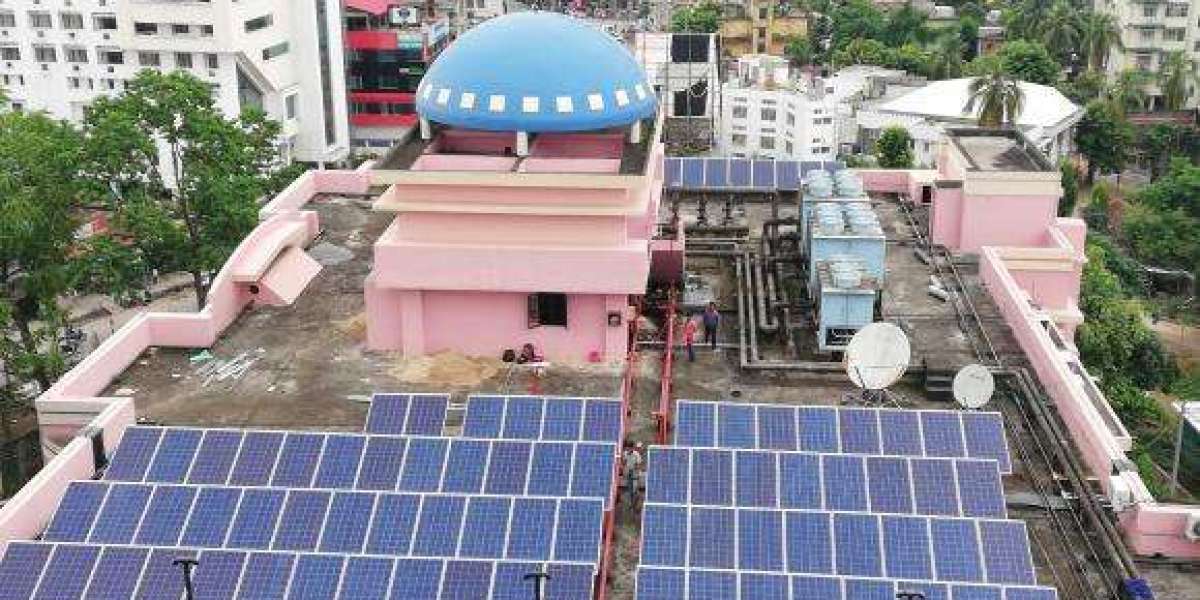In this article by Solar Prabha, we will explain how Rooftop Solar Power Plant is making a positive impact on rural communities and the environment. Let’s dive into it step by step.
What is Rooftop Solar?
Rooftop solar means installing solar panels on the roofs of homes, schools, hospitals, or shops. These panels collect sunlight and turn it into electricity. This electricity can be used for lights, fans, TV, charging phones, or even running small machines.
Rooftop solar is a smart way to generate power without burning coal or using diesel generators, which pollute the air and harm our planet.
Why is Rooftop Solar Good for the Environment?
Using rooftop solar power brings many environmental benefits, such as:
No Air Pollution: Unlike coal or diesel, solar panels do not release harmful smoke or gases.
No Noise Pollution: Diesel generators make loud noise, but solar panels are completely silent.
Saves Water: Traditional power plants use a lot of water. Solar does not need water to make electricity.
Reduces Carbon Footprint: Using solar helps in reducing the amount of carbon dioxide (CO2) released into the air, which helps fight climate change.
Rooftop Solar in Rural Assam: A Ray of Hope
Assam is a beautiful state in northeast India. It has many rivers, forests, and tea gardens. However, many rural areas in Assam still face electricity issues. Power cuts are common, and in some villages, there is no electricity at all.
This is where Solar Prabha comes in. By helping families install rooftop solar panels, Solar Prabha is giving them a chance to live a better life while also protecting the environment.
Let’s look at how rooftop solar is helping rural communities in Assam.
1. Reducing Dependence on Diesel and Firewood
In many villages, people use diesel generators or firewood for electricity and cooking. Both of these options are bad for health and nature.
Diesel generators produce harmful gases like carbon monoxide and particulate matter.
Firewood burning leads to deforestation and indoor air pollution.
When rooftop solar panels are used, families can stop or reduce their use of diesel and firewood. This reduces pollution and protects trees and forests.
2. Clean Air and Better Health
Burning diesel and firewood not only pollutes the air but also causes breathing problems like asthma, lung disease, and eye irritation. Children and elderly people are the most affected.
With rooftop solar, there is no smoke, no fumes, and no smell. People breathe cleaner air, which leads to better health and fewer visits to the doctor.
3. Less Deforestation and More Greenery
In rural Assam, people often cut trees for firewood to cook food or boil water. This leads to deforestation, which affects the local climate, causes soil erosion, and harms wildlife.
Rooftop solar allows families to use solar-powered cookers and water heaters. This means fewer trees are cut down, and the forests can grow back. More trees mean more rain, better soil, and a cooler climate.
4. Helping Fight Climate Change
Climate change is a big problem caused by too much carbon dioxide in the air. It leads to extreme weather, floods, droughts, and rising temperatures.
Using rooftop solar helps lower CO2 emissions because it does not burn any fuel. When thousands of homes in rural Assam switch to solar power, the total carbon emission is reduced a lot.
This is a big step in the fight against climate change, not just for Assam, but for the entire planet.
5. Saving Water
Most power plants need huge amounts of water for cooling. In a place like Assam, which already faces water-related issues like floods and shortages, saving water is very important.
Rooftop solar panels don’t need any water to work. So, when a village uses solar power, it saves thousands of liters of water every year. This water can be used for farming, drinking, and other important needs.
6. Reducing E-Waste and Maintenance Issues
Diesel generators and inverters often break down and need repair or replacement. This creates electronic waste (e-waste), which is difficult to manage in rural areas.
Solar systems, on the other hand, are durable and have fewer parts that need repair. Many solar panels work well for 20–25 years with very little maintenance. This means less e-waste and fewer headaches for rural families.
7. Protecting Wildlife
In Assam’s rural and forest areas, wildlife is often disturbed by deforestation, noise from diesel machines, and pollution. When trees are cut, animals lose their homes.
By switching to solar power and reducing the need for cutting trees or using noisy machines, we are helping protect the natural habitats of birds, elephants, and other wild animals found in Assam.
8. Boosting Local Economy with Green Jobs
Rooftop solar is also helping the local economy by creating green jobs. These include:
Solar panel installation
System maintenance
Solar product sales
Technical support
Young people in rural Assam can now get trained in solar technology and earn a living while supporting clean energy. This creates a strong link between the environment and employment.
9. Reducing Transmission Losses
In remote villages, electricity is often lost when it travels through long wires from the power station to homes. This is called transmission loss.
But rooftop solar systems generate electricity right where it is needed – on the roof of the house. This means no energy is lost in travel, making the system more efficient and eco-friendly.
10. Promoting a Culture of Sustainability
When people see the benefits of rooftop solar in their village, they become more aware of environmental issues. They start taking better care of nature, saving water, avoiding plastic, and planting trees.
Solar energy brings not just light to homes but also awareness to minds. It encourages a culture of sustainability, which will benefit future generations.
Challenges in Rooftop Solar Adoption in Assam
While rooftop solar is full of benefits, there are some challenges too:
Initial cost: The cost of installing solar panels is high for many rural families.
Lack of awareness: Some people are not aware of how solar works or how it can help them.
Weather conditions: Assam gets heavy rainfall, which can affect solar generation during some months.
Technical support: Some remote areas may not have access to technicians or maintenance services.
But the good news is that companies like Solar Prabha are working hard to overcome these problems. With government support, subsidies, and awareness programs, rooftop solar can become common in every rural home.
How Solar Prabha is Making a Difference
Solar Prabha is committed to bringing solar energy to every corner of Assam. Here’s how:
Helping families install affordable rooftop solar panels
Providing maintenance support and customer service
Spreading awareness about solar and the environment
Training youth in solar technology and creating jobs
Working with government schemes to offer subsidies
Through these efforts, Solar Prabha is lighting up homes, protecting nature, and building a cleaner future for rural Assam.
Conclusion
Rooftop solar energy is a gift to rural communities in Assam. It offers clean, green, and reliable electricity while also helping the environment in many ways. From clean air and water to protecting forests and wildlife, the benefits are endless.
With companies like Solar Prabha leading the way, rooftop solar can become a powerful tool to fight pollution, reduce poverty, and promote sustainability in rural Assam.
By choosing rooftop solar, we are not just saving money – we are saving our planet. Let’s support solar energy and help Assam shine brighter, naturally.













